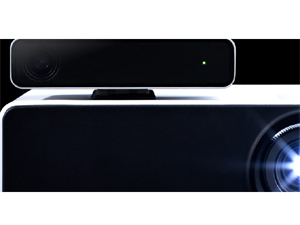



Date:10/04/17
 The researchers behind Microsoft’s mind-blowing IllumiRoom concept and the Box projection art performance are teaming up to try and make projection mapping a reality inside homes. Lightform is a new device that’s aiming to transform living rooms into screens thanks to projectors and intelligent mapping technology. Lightform, co-founded by Microsoft IllumiRoom lead researcher Brett Jones, is a simple small computer that connects to any projector through a HDMI cable.
The researchers behind Microsoft’s mind-blowing IllumiRoom concept and the Box projection art performance are teaming up to try and make projection mapping a reality inside homes. Lightform is a new device that’s aiming to transform living rooms into screens thanks to projectors and intelligent mapping technology. Lightform, co-founded by Microsoft IllumiRoom lead researcher Brett Jones, is a simple small computer that connects to any projector through a HDMI cable.
Lightform includes a processor and high-res camera to scan and locate objects in a room to project imagery onto them. It essentially transforms anything in a room into a screen that can be projected on intelligently. It’s a form of projection mapping, a method to turn ordinary objects into surfaces for moving images, and we’ve seen it applied in music videos, light shows, and commercials in the past. The most intriguing application was Microsoft’s IllumiRoom concept that showed how an Xbox could use a projector to extend games into the physical room elements near a TV.
Microsoft’s concept never made it beyond the research labs, but it’s clear the researchers involved in IllumiRoom and RoomAlive (another Microsoft Research project) still wanted to bring something like it to life. In an interview with Wired, Lightform co-founder Raj Sodhi, who worked on Microsoft’s RoomAlive, reveals the startup is planning to sell its device this summer. Sodhi believes Lightform will eventually be able to recognize shapes like a Christmas tree to allow users to project holiday imagery onto it. Lightform also includes former Adobe, HP, and Google employees.
The applications for Lightform are relatively endless. You could use it to augment objects with additional information or animations, or simply use it as a way to project art onto a wall. While the hardware will be available this summer at an unannounced price point, the key to Lightform will be how the startup lets developers create apps and experiences for this type of technology. IllumiRoom acted as an exciting experiment, but for Lightform to succeed it will need to progress beyond gaming scenarios and show how projection mapping could exist in our day-to-day lives.
The brains behind Microsofts stunning IllumiRoom concept are bringing it to life
 The researchers behind Microsoft’s mind-blowing IllumiRoom concept and the Box projection art performance are teaming up to try and make projection mapping a reality inside homes. Lightform is a new device that’s aiming to transform living rooms into screens thanks to projectors and intelligent mapping technology. Lightform, co-founded by Microsoft IllumiRoom lead researcher Brett Jones, is a simple small computer that connects to any projector through a HDMI cable.
The researchers behind Microsoft’s mind-blowing IllumiRoom concept and the Box projection art performance are teaming up to try and make projection mapping a reality inside homes. Lightform is a new device that’s aiming to transform living rooms into screens thanks to projectors and intelligent mapping technology. Lightform, co-founded by Microsoft IllumiRoom lead researcher Brett Jones, is a simple small computer that connects to any projector through a HDMI cable.Lightform includes a processor and high-res camera to scan and locate objects in a room to project imagery onto them. It essentially transforms anything in a room into a screen that can be projected on intelligently. It’s a form of projection mapping, a method to turn ordinary objects into surfaces for moving images, and we’ve seen it applied in music videos, light shows, and commercials in the past. The most intriguing application was Microsoft’s IllumiRoom concept that showed how an Xbox could use a projector to extend games into the physical room elements near a TV.
Microsoft’s concept never made it beyond the research labs, but it’s clear the researchers involved in IllumiRoom and RoomAlive (another Microsoft Research project) still wanted to bring something like it to life. In an interview with Wired, Lightform co-founder Raj Sodhi, who worked on Microsoft’s RoomAlive, reveals the startup is planning to sell its device this summer. Sodhi believes Lightform will eventually be able to recognize shapes like a Christmas tree to allow users to project holiday imagery onto it. Lightform also includes former Adobe, HP, and Google employees.
The applications for Lightform are relatively endless. You could use it to augment objects with additional information or animations, or simply use it as a way to project art onto a wall. While the hardware will be available this summer at an unannounced price point, the key to Lightform will be how the startup lets developers create apps and experiences for this type of technology. IllumiRoom acted as an exciting experiment, but for Lightform to succeed it will need to progress beyond gaming scenarios and show how projection mapping could exist in our day-to-day lives.
Views: 492
©ictnews.az. All rights reserved.Similar news
- Justin Timberlake takes stake in Facebook rival MySpace
- Wills and Kate to promote UK tech sector at Hollywood debate
- 35% of American Adults Own a Smartphone
- How does Azerbaijan use plastic cards?
- Imperial College London given £5.9m grant to research smart cities
- Search and Email Still the Most Popular Online Activities
- Nokia to ship Windows Phone in time for holiday sales
- Internet 'may be changing brains'
- Would-be iPhone buyers still face weeks-long waits
- Under pressure, China company scraps Steve Jobs doll
- Jobs was told anti-poaching idea "likely illegal"
- Angelic "Steve Jobs" loves Android in Taiwan TV ad
- Kinect for Windows gesture sensor launched by Microsoft
- Kindle-wielding Amazon dips toes into physical world
- Video game sales fall ahead of PlayStation Vita launch





















